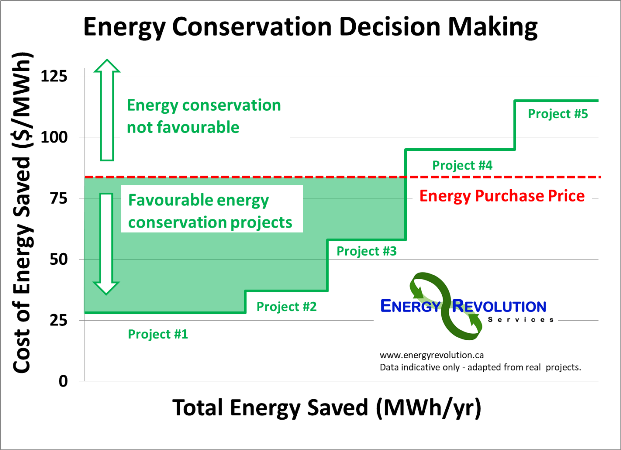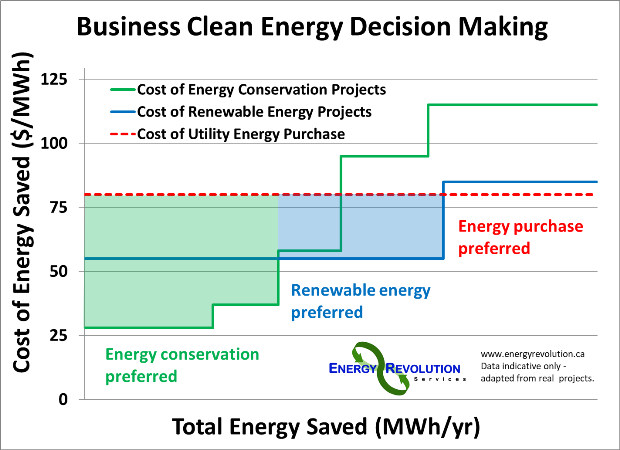|
Michael Pullinger The energy industry is changing rapidly, opening up new opportunities for innovative small businesses. Businesses that have previously only been passive consumers of energy can become prosumers – (generating some energy needs on their own - Megawatts). But many cost effective opportunities in clean energy come from first reducing energy consumption (Negawatts). Which should you pursue first? Is one preferable to the other? How to Compare Apples and Oranges Once your business has completed an assessment to identify your conservation and renewable energy opportunities, you need to compare costs (up-front outlay, running costs) and benefits (energy savings, reduced maintenance). You can use the Levelised Cost of Energy (LCOE) to work out the average cost of each unit of energy saved (or produced) over the entire lifetime of a project. Costs of energy can be compared using the LCOE whether you are purchasing from the utility or producing energy from wind, solar, hydro or biomass. Similarly, you can look at what it cost you to save each kWh of energy over a certain period of time. When to Reduce? Your energy conservation options could include lighting upgrades, heating and ventilation system modifications or tweaking of your manufacturing processes. Some of these projects may have a low up-front cost with high potential for energy savings (highly favourable), while others will be the opposite (less favourable). Provided the assumptions going into the assessment are correct, it is worthwhile pursuing any project with lower energy costs (LCOE) than the cost of the energy you purchase from the local utility. These projects will reduce your business operating costs in the long run. When to Produce? The good returns often make energy conservation projects the “low hanging fruit” in your arsenal - but there’s a limit. The laws of physics tell us that we can’t get something for nothing, and we can never achieve perfect efficiency. However, in many parts of the world, renewable energy can be produced by small businesses at lower cost than energy purchased from the local utility. For most businesses there will be a crossover point where renewable energy production becomes cheaper than the remaining energy conservation projects. At that point it’s important to bring clean energy generation into the mix. However, you will likely still purchase a portion of your energy from the local utility. So where to now?
While there are altruistic reasons for pursuing sustainable energy, it's important to consider the financial returns. Green energy is now such a great business opportunity that reducing your footprint needn’t cost you. Smart choices will leave more money in your pocket in the long run, allowing you to grow your business. If sustainability is your main goal, the money saved can allow you to invest in even more clean energy.
4 Comments
Cornelius
4/2/2019 09:29:08 pm
The cost of renewables (Megawatts) are falling at a much faster rate than the post of energy efficiency technologies (Negawatts). It will be interesting to see if efficiency technology will feel a price pressure from renewables.
Reply
Michael Pullinger
5/2/2019 02:33:52 pm
Some great comments Cornelius. The framework of comparing energy efficiency and renewables as I've used here allows for a comparison that isn't always possible when using the payback period alone. As a result, many businesses focus solely on energy conservation opportunities, even though the cost of renewable energy keeps coming down. It always makes sense to compare both.
Reply
26/2/2020 06:39:06 am
Clean energy is what we need to keep on using. The world that we are living in is just not that good anymore. If you ask me, people need to continue to go and do lots more of things for yourself. I hope that we all start to use clean energy a lot more frequently from now on. We need to understand that going clean is the future of this world that we are living on, it is the truth.
Reply
Leave a Reply. |
Categories
All
Archives
May 2024
|
Site powered by Weebly. Managed by Web Hosting Canada



 RSS Feed
RSS Feed